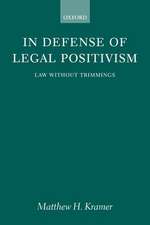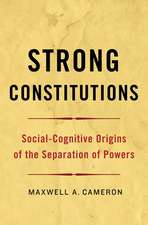Liberalism with Excellence
Autor Matthew H. Krameren Limba Engleză Hardback – 10 mai 2017
Preț: 632.98 lei
Preț vechi: 861.71 lei
-27% Nou
Puncte Express: 949
Preț estimativ în valută:
121.16€ • 131.65$ • 101.84£
121.16€ • 131.65$ • 101.84£
Carte tipărită la comandă
Livrare economică 09-15 aprilie
Preluare comenzi: 021 569.72.76
Specificații
ISBN-13: 9780198777960
ISBN-10: 0198777965
Pagini: 448
Dimensiuni: 170 x 241 x 34 mm
Greutate: 0.82 kg
Editura: OUP OXFORD
Colecția OUP Oxford
Locul publicării:Oxford, United Kingdom
ISBN-10: 0198777965
Pagini: 448
Dimensiuni: 170 x 241 x 34 mm
Greutate: 0.82 kg
Editura: OUP OXFORD
Colecția OUP Oxford
Locul publicării:Oxford, United Kingdom
Recenzii
Liberalism with Excellence is Matthew Kramer's first of two books on justice. It is, as he states in its preface, 'in many respects a prolegomenon to the second volume, A Stoic Theory of Justice'. The book is, nonetheless, a well-argued and complex self-standing work; a fresh contribution to the sempiternal question: what are the bases for the legitimacy of the exercise of public power?
Kramer carefully clarifies the various terms and positions in a debate often wracked with misunderstanding... Liberalism with Excellence is an excellent book that treads new ground in the debate. Kramer proposes a form of aspirational perfectionism which, unlike the elitist Nietzschean tradition, is both egalitarian and liberal. He draws on aspects of both traditional perfectionist theories and contemporary neutralist accounts to offer a thesis that seeks to resolve some of the problems faced by the respective sides in the debate.
Kramer's doctrine of aspirational perfectionism brings to the forefront an important consideration in debates about the relationship between excellence and justice, by pointing out how people can benefit from excellence that is not of their own making... Kramer's argument is a salutary supplement to the perfectionist literature.
The brief summary I have given barely scratches the surface of Kramer's comprehensive engagement with the now sprawling literature on this topic. His careful discussions of Quong, Gaus, and Raz in particular provide a sophisticated yet accessible guide to the recent debates over liberal neutrality. For good measure, the book also offers an interesting reconstruction of Rawls's understanding of self-respect, a searching critique of perfectionist conceptions of freedom, and some very enjoyable Shakespearean references. It would therefore work well as an assigned text in a graduate course, bringing newcomers up to speed on recent scholarship while offering them provocative food for thought. It also manages to open up an intriguing and quite novel perspective on perfectionism despite a saturated surrounding literature.
Kramer carefully clarifies the various terms and positions in a debate often wracked with misunderstanding... Liberalism with Excellence is an excellent book that treads new ground in the debate. Kramer proposes a form of aspirational perfectionism which, unlike the elitist Nietzschean tradition, is both egalitarian and liberal. He draws on aspects of both traditional perfectionist theories and contemporary neutralist accounts to offer a thesis that seeks to resolve some of the problems faced by the respective sides in the debate.
Kramer's doctrine of aspirational perfectionism brings to the forefront an important consideration in debates about the relationship between excellence and justice, by pointing out how people can benefit from excellence that is not of their own making... Kramer's argument is a salutary supplement to the perfectionist literature.
The brief summary I have given barely scratches the surface of Kramer's comprehensive engagement with the now sprawling literature on this topic. His careful discussions of Quong, Gaus, and Raz in particular provide a sophisticated yet accessible guide to the recent debates over liberal neutrality. For good measure, the book also offers an interesting reconstruction of Rawls's understanding of self-respect, a searching critique of perfectionist conceptions of freedom, and some very enjoyable Shakespearean references. It would therefore work well as an assigned text in a graduate course, bringing newcomers up to speed on recent scholarship while offering them provocative food for thought. It also manages to open up an intriguing and quite novel perspective on perfectionism despite a saturated surrounding literature.
Notă biografică
Matthew H. Kramer is Professor of Legal and Political Philosophy at the University of Cambridge and a Fellow of Churchill College, Cambridge. He is Director of the Cambridge Forum for Legal and Political Philosophy, and has been a Fellow of the British Academy since 2014. He is the author of 14 previous books and the co-editor of 4 additional books. Eight of his previous books have been published with the OUP, the most recent being Torture and Moral Integrity (2014).
















